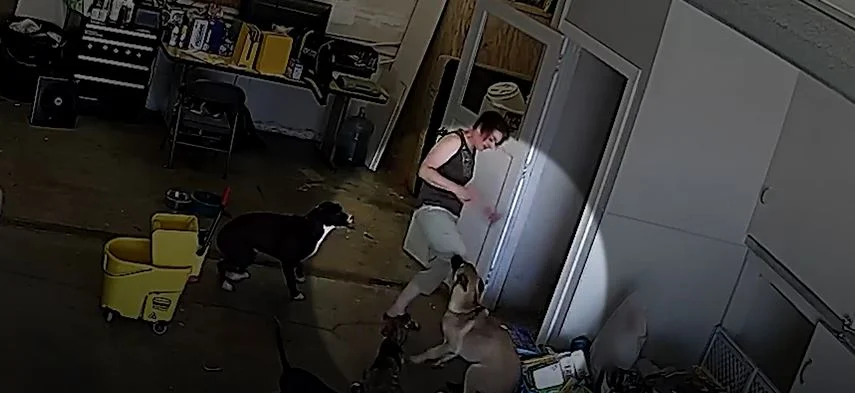The Disturbing Truth Behind “Rescues” Like Woofin Palooza
Animal rescues are supposed to be safe havens for dogs, cats, and other animals in desperate need of care. They are places the public trusts to protect, rehabilitate, and ultimately rehome animals who have already suffered abandonment, neglect, or abuse. Tragically, not every organization that claims to be a “rescue” is what it seems.
Recently, Samantha Miller, co-owner of the sham rescue Woofin Palooza, was caught on camera punching, kicking, and throwing terrified dogs under her care. The footage is a horrifying reminder that animals can be subjected to unimaginable cruelty—even in places that advertise themselves as sanctuaries.
This is not an isolated incident. It is part of a broader pattern of abuse that highlights the urgent need for vigilance, oversight, and accountability in the world of animal rescue.
The Dark Side of So-Called “Rescues”
Most people see the word rescue and assume compassion, safety, and advocacy. But too often, unscrupulous individuals exploit this trust. They take in animals, solicit donations, and present themselves as heroes—while behind closed doors, the animals are neglected, mistreated, or even abused.
The case of Woofin Palooza shows how far some so-called rescuers are willing to go. Instead of providing love and healing, Miller subjected animals to violence and fear. Dogs under her care were physically assaulted, thrown around like objects, and treated in ways that no living being should ever endure.
At Sustainable Action Now, we have long warned against putting blind faith in self-proclaimed “rescuers.” Sadly, too many cases have surfaced in recent years of supposed rescues being exposed for hoarding, neglect, or outright abuse.
Why This Happens
There are several reasons why “fake rescues” slip through the cracks:
- Lack of oversight: In many states, animal rescues are not closely regulated, creating opportunities for abusers to operate under the guise of helping.
- Profit motive: Some sham rescues see animals as a way to make money through donations, adoption fees, or even breeding.
- Emotional manipulation: Abusers exploit the compassion of the public, using heartbreaking stories and images to gain trust and financial support.
- Overcrowding and neglect: Even well-meaning but poorly managed rescues can quickly spiral into situations of hoarding and neglect, with animals paying the ultimate price.
The Cost to Animals
For the dogs at Woofin Palooza, the cost was immediate and severe: fear, pain, and betrayal. But the cost goes beyond one facility. Every time a sham rescue is exposed, public trust in legitimate rescues erodes. Donors hesitate. Adopters second-guess. And animals in need suffer longer as a result.
The animals in these situations are already some of the most vulnerable beings in our communities. They come from abusive households, overburdened shelters, or situations of abandonment. They deserve better than to be retraumatized by those who claim to be their saviors.
How You Can Protect Animals
The sad truth is that the public must remain vigilant. Here are steps you can take to protect animals and ensure your support is going to real rescues:
- Do your research: Look into the background of any rescue before donating or adopting. Check for state registration, nonprofit status, and reviews from reputable sources.
- Visit in person: A legitimate rescue should welcome visitors and transparency. If they make excuses or restrict access to animals, consider it a red flag.
- Look for veterinary partnerships: Real rescues work closely with veterinarians to ensure animals are healthy and cared for.
- Watch for numbers: Facilities that are overcrowded or constantly begging for funds without clear updates on animal care may be hoarding animals.
- Report suspected abuse: If you suspect a rescue is neglecting or abusing animals, report it to local authorities or animal welfare organizations immediately.
The Bigger Mission
Cases like Woofin Palooza should serve as a wake-up call. The fight for animal welfare does not end with closing down puppy mills or passing anti-cruelty laws. It also requires shining a light on those who hide behind the word “rescue” while inflicting suffering.
At Sustainable Action Now, we are committed to exposing cruelty in all its forms—whether it comes from corporate exploitation, wildlife trafficking, or individuals who abuse animals under the pretense of saving them.
The horrifying abuse at Woofin Palooza is not just about one bad actor—it is about a systemic issue of weak oversight and misplaced trust. The lesson is clear: never put blind faith in self-proclaimed rescuers. Ask questions, demand transparency, and hold organizations accountable.
For the animals, vigilance can mean the difference between suffering and safety. Together, we can ensure that the word rescue truly means what it should: compassion, protection, and a second chance at life.


